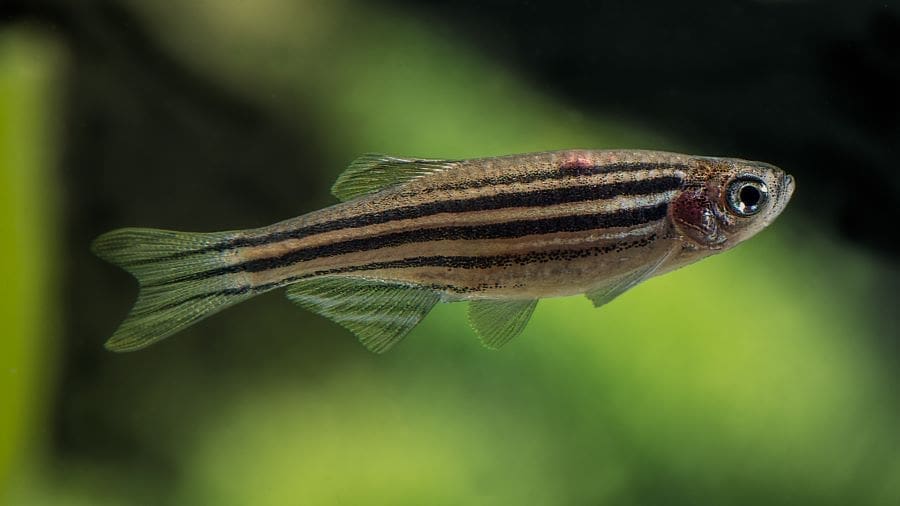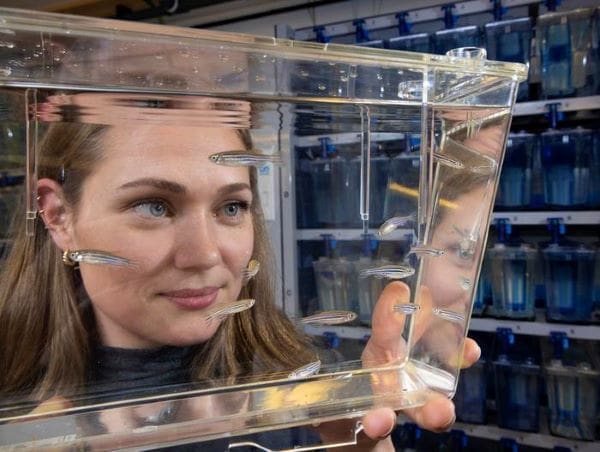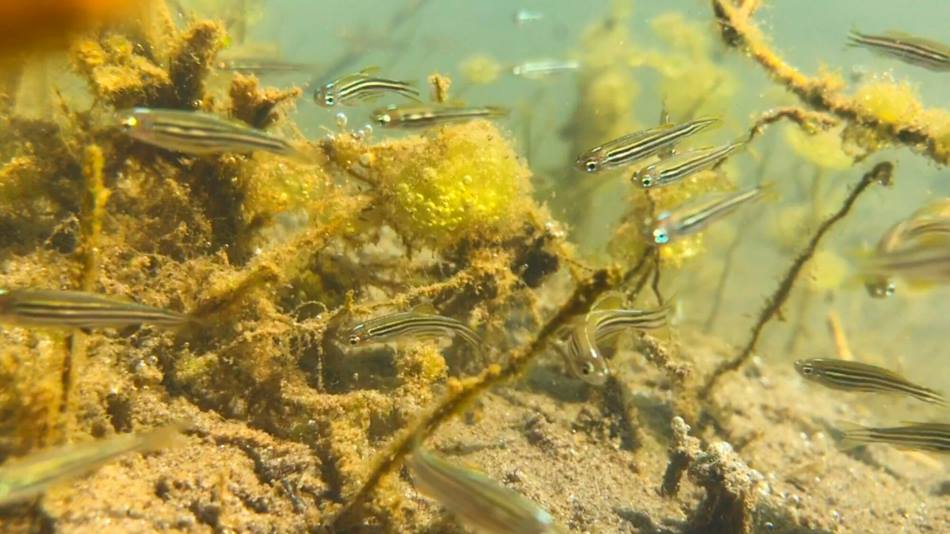Summary:
As climate change drives global temperatures higher, fish and other cold-blooded animals are under growing pressure to adapt. A new study published in Nature Climate Change explores whether such adaptation comes with hidden costs. Researchers at the Norwegian University of Science and Technology (NTNU) bred zebrafish (Danio rerio) over seven generations to tolerate increasingly higher water temperatures, aiming to uncover whether thermal tolerance affected other traits like growth, metabolism, or reproduction. The surprising result: it didn’t.
Led by Fredrik Jutfelt, the research team found that the zebrafish adapted to warmer water also showed increased tolerance to cold, contradicting long-held assumptions about trade-offs in thermal evolution. “We didn’t really see any trade-offs,” said lead author Anna Andreassen. Tests showed no differences in metabolic rate, swimming ability, fecundity, or heat shock protein levels between fish bred for heat tolerance and their control counterparts.
While the study suggests that zebrafish can evolve heat resilience without compromising other physiological traits, researchers caution that this may not reflect what wild fish populations can achieve under real-world conditions. Unlike lab-bred zebrafish, wild populations face many more stressors and may not evolve rapidly enough to keep pace with climate change.

Does adapting to a warmer climate have drawbacks?
Global warming is already very tough for animals in the wild, but it may be toughest for creatures like fish, whose body temperatures are controlled by the water temperatures around them.
Fish have to evolve to handle higher water temperatures, if they can’t move to areas with colder water. But what if adapting to warmer water has other unwanted consequences?
In the new study, researchers looked at zebrafish that they had specially bred over 7 generations to tolerate higher maximum water temperatures.
In the research world, an experiment of this size and scale is unique, said Fredrik Jutfelt, senior author of the paper and head of the Jutfelt Fish Ecophysiology Lab at the Norwegian University of Science and Technology (NTNU). Jutfelt also has a position at the University of Gothenburg.
“Very few research groups have been able to test how fish can evolve when facing climate change, because it takes thousands of fish and many years of careful experiments,” he said. “That makes this work very important because we can finally start to understand how evolution may help fish adapt to warming waters.”
The study was designed to see if the higher heat tolerance would affect other aspects of the fish’s metabolism and ability to survive.
Surprising result
Much to their surprise, the researchers found that the fish that were bred to tackle warmer temperatures were also more tolerant to colder temperatures.
“What we normally expect, if we compare species in the wild that are warm adapted, is that they have lower cooling tolerance. And then we saw this higher cooling tolerance, which was surprising,” said Anna Andreassen, the first author of the new paper.
Andreassen was a PhD research fellow at NTNU in the Jutfelt group when she did this research, and is now a postdoc at the Technical University of Denmark.
What was even more surprising for the researchers was that increased heat tolerance didn’t affect other aspects of the fish’s metabolism or ability to reproduce or swim.
A wild population from India
Andreassen and her colleagues designed their experiments to compare three groups from a population of wild fish collected in India and brought back to NTNU in 2016.
One group from this population was specifically selected to be more tolerant to high temperatures. A second control group of “normal” zebrafish was allowed to reproduce without being selected for a specific heat tolerance. The third group from the same population was selected to be worse at tolerating heat.

After observing the change in warming tolerance, the researchers compared other traits among the three groups to see if being adapted to warmer temperatures gave fish a physiological or reproductive advantage or disadvantage compared to “natural” fish from the same original group.
Oxygen is key
One test involved seeing how efficiently the 2 cm long fish used oxygen.
Just like with humans, higher temperatures increase the fish’s metabolism, so that individuals need more oxygen at higher temperatures.
One possible mechanism to explain why heat-tolerant fish do better in warmer waters might be that their bodies could use oxygen more efficiently than the controls or the fish with low warm tolerance.
“So one idea is that the (heat-tolerant) fish itself has some capacity to take up more oxygen than others,” Andreassen said.
Testing in a swim tunnel
So the researchers put the fish in a fish equivalent of a treadmill, a swim tunnel, where the researchers could adjust the water speed and simultaneously measure the oxygen consumption.
“We can measure how much oxygen they take up from the water while they’re swimming at their maximum capacity,” Andreassen said. “It’s like putting them on little fish treadmills.”
But much to their surprise, they essentially found no difference in the use of oxygen among groups.
There was one exception. The group that was bred to be more sensitive to high temperatures didn’t do as well as the other groups when temperatures were highest.
In short, “we don’t see that oxygen actually helps fish in tolerating warming in this case,” Andreassen said.
“And that is big in our field,” she said. “One very big hypothesis is that (global) warming itself might not limit the animals, but that oxygen becomes limited at high temperatures. But we didn’t see that.”
Swimming and having babies
The story was more or less the same when it came to other measures of what makes a successful life for a fish.
The researchers thought there might be some kind of trade-off for tolerating higher water temperatures. So they looked at the commonly accepted indicators of what makes a fish well-adapted to its environment.
“When we look at how well they reproduce, and how well they grow and perform, we didn’t really see any trade-offs” for the fish that had evolved to tolerate warmer temperatures, Andreassen said.
That doesn’t mean there isn’t a trade-off, she said, but that the researchers didn’t find one in the most commonly accepted measures of fitness that they tested.
Better in a warming world?
Global warming means higher average temperatures, but it can also cause severe heat waves. Researchers from all over the planet are scrambling to understand if plants and animals can handle this additional stress, and if so, how.
It took three years for researchers in the Jutfelt group to breed their heat-tolerant zebrafish. Could wild populations evolve on their own that rapidly?
Rachael Morgan, who also did her PhD with the same fish from the Jutfelt Lab concluded in a 2020 article that there was a low potential for zebrafish to be saved by evolving to tolerate higher temperatures. Nevertheless, Andreassen said, it’s important for biologists understand how these adaptations might actually come about.
“We’re trying to understand the physiology and what is actually changing in the body of the animals,” she said.
Jutfelt said it’s important not to overlook the larger problems that come from the warming the planet is experiencing now.
“Even though the zebrafish didn’t show any adverse effects from developing a tolerance to higher water temperatures, climate change will nevertheless continue to pose unanticipated and dangerous challenges to all life on Earth,” he said.
Journal Reference:
Anna H. Andreassen, Jeff C. Clements, Rachael Morgan, Davide Spatafora, Moa Metz, Eirik R. Åsheim, Christophe Pélabon & Fredrik Jutfelt, ‘Evolution of warming tolerance alters physiology and life history traits in zebrafish’, Nature Climate Change (2025). DOI: 10.1038/s41558-025-02332-y
Article Source:
Press Release/Material by Nancy Bazilchuk | Norwegian University of Science and Technology (NTNU)
Featured image: Researchers from the Jutfelt Lab traveled to India in 2016 to collect wild zebrafish. These animals were the basis for a unique study on how selecting fish for heat tolerance over seven generations would affect their evolution. Credit: Fredrik Jutfelt | NTNU




